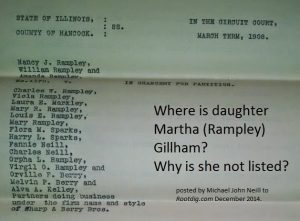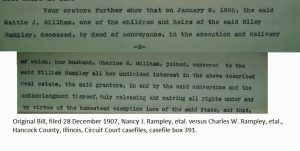 The problem with reading things quickly is that valuable clues tend to be glossed over.
The problem with reading things quickly is that valuable clues tend to be glossed over.
We’ve discussed the partition suit among Riley Rampley’s heirs before, but a closer reading of the list of parties involved indicated that one of Riley’s children was missing: Martha (Rampley) Gillham.
The question is why?
Thinking she was simply left out is not a valid conclusion. Court cases involving property rights need to involve all the interested heirs. Even if she were intentionally left out (extremely doubtful), it’s unlikely that one of her siblings wouldn’t mention the case to her and, given that notice later appeared in the newspaper and publicly via sale bills for the resulting auction, it’s unlikely a neighbor wouldn’t mention it to her.
If Martha were deceased at the time of the court action and left no heirs of her own, she wouldn’t have to have been listed. That’s not the case either–Martha was living at the time of the court case and had children of her own.
So why?
It’s actually pretty simple, but like many things, requires a reading of all the relevant papers in the case.
The Gillhams had sole their interest in the Rampley estate to her brother, William Rampley.
The Original Bill, filed in December of 1907, references the sale from Gillham to William Rampley and also provides the deed volume and page number in the Hancock County Recorder’s Office where the deed of sale was recorded.
The reason Gillham didn’t have to be a part of the suit was that she had transferred her rights in the estate to her brother. She was not overlooked.
 Two of Riley Rampley’s children borrowed against their share in the estate–with their mother’s knowledge and consent. Gillham is known to have left Hancock County, Illinois. It’s possible that instead of mortgaging her interest to raise money, she simply sold it.
Two of Riley Rampley’s children borrowed against their share in the estate–with their mother’s knowledge and consent. Gillham is known to have left Hancock County, Illinois. It’s possible that instead of mortgaging her interest to raise money, she simply sold it.
It’s always worth determining why someone isn’t listed where they are supposed to be.
There’s usually a reason.
Sometimes that reason is made explicit–as it is here.
Sometimes that reason is buried under indirect references.
Regardless of how easy the reason is to uncover, genealogical absence should make the researcher wonder.

No responses yet